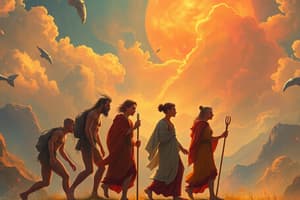Podcast
Questions and Answers
The Neolithic Revolution led to the establishment of temporary settlements and the adoption of agriculture.
The Neolithic Revolution led to the establishment of temporary settlements and the adoption of agriculture.
False (B)
The Sumerians, Egyptians, and Indus Valley civilizations were among the first civilizations that emerged due to cultural and technological advancements.
The Sumerians, Egyptians, and Indus Valley civilizations were among the first civilizations that emerged due to cultural and technological advancements.
True (A)
Language has not played a significant role in human history, according to the text.
Language has not played a significant role in human history, according to the text.
False (B)
Humanity's future is already predetermined and cannot be influenced by collective efforts.
Humanity's future is already predetermined and cannot be influenced by collective efforts.
The human story is solely enriched by scientific discovery and has no connection to exploration.
The human story is solely enriched by scientific discovery and has no connection to exploration.
Study Notes
Exploring the Human: A Journey Through Time and Evolution
Throughout our existence, humankind has been a subject of fascination, not only for ourselves but also for those seeking to uncover the mysteries of our past and understand our place in the world. This journey begins with the history of our species and the evolutionary path that led to our diverse and interconnected global community.
Early Origins
The human family tree can be traced back over 3.5 million years to the common ancestor of modern humans and our closest living relatives, the great apes. Our species, Homo sapiens, first appeared around 300,000 years ago in Africa, evolutionarily distinct from our ancestors, Homo neanderthalensis and Homo denisova. The earliest Homo sapiens, known as Homo sapiens idaltu, were similar in appearance to today's humans but had smaller brains relative to body size.
Archaeological Milestones
The Oldowan culture, dating back to around 2.6 million years ago, marked the beginning of humankind's use of stone tools, providing a significant advantage in hunting, food processing, and the development of early social structures. As humans evolved and dispersed across the globe, further cultural milestones followed, such as the Acheulean culture (approx. 700,000 to 130,000 years ago), the Middle Paleolithic (approx. 300,000 to 40,000 years ago), and the Upper Paleolithic (approx. 40,000 to 10,000 years ago). These cultural advancements were accompanied by the development of more sophisticated toolmaking, the use of fire, and the emergence of new forms of art and symbolism.
Migration and Interaction
Humankind's expansion across the globe, resulting in the intermingling of diverse cultures and populations, is a crucial chapter in our history. The out-of-Africa migration saw early humans leave Africa and populate the rest of the world, eventually resulting in a remarkable level of genetic and cultural diversity. The Neolithic Revolution (approx. 10,000 to 4,500 years ago) saw the establishment of permanent settlements and the adoption of agriculture, leading to the growth of civilizations and urbanization.
The Rise of Civilizations
Cultural and technological advancements led to the emergence of the first civilizations, including the Sumerians, Egyptians, Indus Valley, and the first European civilizations, such as the Minoans and Mycenaeans. These societies introduced writing, art, and architecture, laying the groundwork for the development of the modern world.
Beyond Genetics
In addition to genetic history, understanding the human story requires exploring social, cultural, and technological advancements. Language, for example, is an essential component of human history, enabling the communication of thoughts, ideas, and emotions. The development of writing and the various forms of literature, from poetry to plays and novels, offers insights into human culture and society.
The Future of Humanity
As we continue to explore and evolve, the future of humankind remains unwritten. From the first steps in space to the ongoing impact of globalization and emerging technologies, our species confronts new challenges and opportunities. The future of humanity is shaped by our collective efforts to balance progress and sustainability, empathy, and collaboration.
In conclusion, the human story is an incredible tapestry of history, evolution, and culture. Our understanding of this story is continually enriched by scientific discovery and ongoing exploration, reminding us of our past, informing our present, and guiding us towards a better future.
Studying That Suits You
Use AI to generate personalized quizzes and flashcards to suit your learning preferences.
Description
Test your knowledge on the history of humankind, from early origins to the rise of civilizations and beyond. Explore topics such as archaeological milestones, migration patterns, the development of languages and literature, and the future of humanity.




